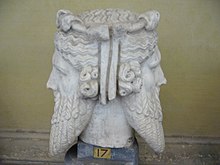Ianus
| Janus | |
|---|---|
| God of beginnings, gates, transitions, time, duality, doorways, passages, and ending | |
| Member of Di selecti | |

statue representing Janus Bifrons in the Vatican Museums
|
|
| Other names | Ianuspater ("Janus Father"), Ianus Quadrifrons ("Janus Fourfaced"), Ianus Bifrons ("Janus Twofaced") |
| Abode | at the limits of Earth, at the extremity of Heaven |
| Symbol | two faces |
| Consort | Camese |
| Parents | None: primordial deity |
| Siblings | Camese |
| Children | Canens, Aithex, Olistene, Tiberinus, Fontus |
| Etruscan equivalent | Culśanś |
In ancient Roman religion and myth, Janus (/ˈdʒeɪnəs/; Latin: Iānus, pronounced [ˈjaː.nus]) is the god of beginnings, gates, transitions, time, duality, doorways, passages, and endings. He is usually depicted as having two faces, since he looks to the future and to the past. It is conventionally thought that the month of January is named for Janus (Ianuarius), but according to ancient Roman farmers' almanacs Juno was the tutelary deity of the month.
Janus presided over the beginning and ending of conflict, and hence war and peace. The doors of his temple were open in time of war, and closed to mark the peace. As a god of transitions, he had functions pertaining to birth and to journeys and exchange, and in his association with Portunus, a similar harbor and gateway god, he was concerned with travelling, trading and shipping.
Janus had no flamen or specialised priest (sacerdos) assigned to him, but the King of the Sacred Rites (rex sacrorum) himself carried out his ceremonies. Janus had a ubiquitous presence in religious ceremonies throughout the year, and was ritually invoked at the beginning of each one, regardless of the main deity honored on any particular occasion.
...
Wikipedia
